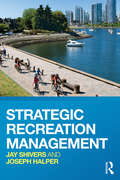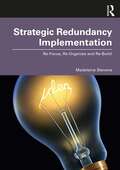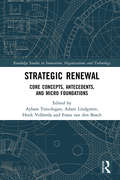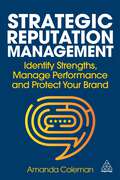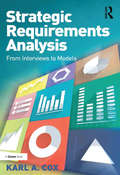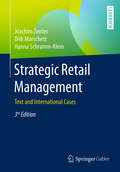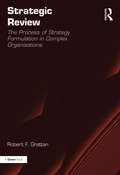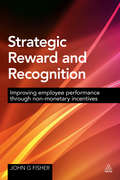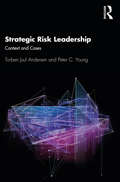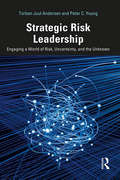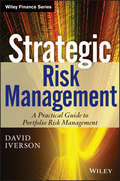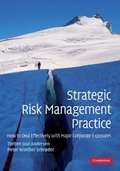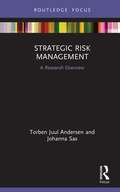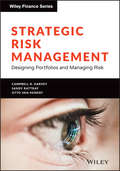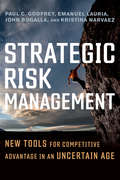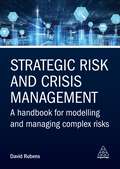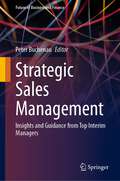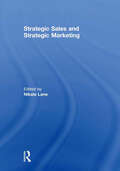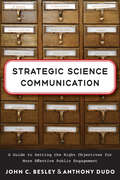- Table View
- List View
Strategic Questions in Food and Beverage Management (Hospitality Essentials Series)
by Roy C WoodThis book provides students with a series of critical reviews of issues in food and beverage management addressing a variety of managerial dilemmas of a more complex nature such as how important is the meal experience and is food an art form? These are accompanied by discussion points, questions, and case studies to aid application, critical thinking and analysis. Written by leading hospitality academic, this short critical yet accessible text will be value for all future hospitality managers
Strategic Recreation Management
by Jay Shivers Joseph W. HalperStrategic Recreation Management is a comprehensive and up-to-date introduction to the fundamental principles, managerial techniques and practices in the public administration of recreational services. It covers every key facet of public management as it concerns recreational service, including organizational, operational, planning, developmental, and managerial procedures, as well as examining all the contextual factors that influence the delivery of recreation, such as political pressures, economics, social considerations, physical resources, and citizens' perception of the field and its performance. Each chapter offers illustrative case studies from the real world of recreation management, with chapters sequenced to represent the typical day-to-day challenges and issues in recreation service. Authors Jay Shivers and Joseph Halper have many years' experience of working in the recreational sector, as educators and practitioners, and the result is a textbook that provides the perfect foundation for any degree-level course in recreation management, as well as being an indispensible reference for all professionals working in recreation service.
Strategic Redundancy Implementation: Re-Focus, Re-Organise and Re-Build
by Madeleine StevensRedundancy, restructuring, downsizing. There are few, if any, other management books on this important topic, and yet the pace of redundancies has only accelerated in recent years. Coupled with this, many companies that implement redundancies as a cost-cutting exercise often fail to achieve their goal. Whilst viewed as an uncomfortable topic by many, guidance on how to implement a redundancy programme that is fair, proportionate and ultimately leads to improved organisational performance, has never been more needed. This book fills this important gap. It takes the reader through a redundancy implementation strategy – Re-Focus, Re-Organise and Re-Build – that incorporates the key aspects of planning and analysis, fairness and justice, and prepares management for redundancy implementation through training. What will your communications include? What will be your strategy for implementation? What training does your management need? Various helpful template examples are included for employee consultation, communication and training. The book will be invaluable for business managers, HR professionals, employee representatives and HR students.
Strategic Renewal: Core Concepts, Antecedents, and Micro Foundations (Routledge Studies in Innovation, Organizations and Technology)
by Adam Lindgreen Aybars Tuncdogan Henk Volberda Frans van den BoschStrategic Renewal is an original research anthology offering insight into a subject area which, although critical for the sustained success of organizations, has received relatively little attention as distinct from the more general phenomenon of strategic change. Firstly, by providing a summary of the literature, this research anthology helps graduate students and new researchers grasp the current state of affairs in the field. Secondly, this research anthology will help update the knowledge base of the existing researchers in the field. By bringing together various studies, the research anthology determines the core concepts of the field and elucidates the key gaps and future research areas. Through contributions building on the knowledge bases of other disciplines, this research anthology develops an interdisciplinary research agenda, giving the reader an in-depth understanding of the mediating, moderating, and antecedent variables concerning strategic renewal. Strategic Renewal aims to provide a state-of-understanding to the subject, as well as a clear picture of the cross-disciplinary landscape that informs the subject. Thus, this research anthology is essential reading for managers, consultants, and other practitioners, as well as students and scholars of business.
Strategic Reputation Management: Identify Strengths, Manage Performance and Protect Your Brand
by Amanda ColemanIn today's hyper-connected world, reputation is everything. This book explores the role of reputation management within your organization, providing the latest insights and strategies to help you navigate it.Strategic Reputation Management is a practical guide that equips PR and communication professionals with the tools they need to navigate the complexities of reputation management effectively. With a wealth of practical tips and strategies, readers will gain the knowledge and expertise needed to enhance or build their organization's reputation.Using real-world examples and expert interviews, this book will look at reputation management both before, during and after a crisis. It will consider how to establish a positive reputation, to maintain it when under pressure and to turn a bad reputation around after problems have occurred. It will also include top tips, checklists and outline a new framework for reputation management.Strategic Reputation Management is a must-read for anyone seeking to understand, manage and master the intricate world of reputation management.
Strategic Requirements Analysis: From Interviews to Models
by Karl A. CoxA strategic requirement is something an organisation sets out to achieve; it could be the long-term vision the organisation sets itself, the key business condition for a specific project to be a success or a business strategy to achieve a goal. A set of strategic requirements defines the goals, strategies and tactics that organisations need to put in place to give them direction and impetus. Business analysts and consultants have to understand strategic requirements to know where projects can deliver business benefits and where not. The ability of the analyst to interview, gather, analyse, model and present strategic requirements is key to success. The primary tool consultants and business analysts use for communication is talking; but, if you cannot present all that incredible information back to your client effectively, it is hard for them and you to get to grips quickly enough with what is going on. Being able to present a model is really powerful because it provides a visual format and structure on one page to reason about those strategic requirements. Dr Karl A. Cox offers a process, guidelines and ideas - that have been tried and tested in practice - for conducting interviews and shows you how to rapidly turn interview findings into strategic requirements models all on one page, to present to your clients, customers, team and / or supervisors.
Strategic Retail Management
by Dirk Morschett Hanna Schramm-Klein Joachim ZentesThis book is devoted to the dynamic development of retailing. The focus is on various strategy concepts adopted by retailing companies and their implementation in practice. This is not a traditional textbook or collection of case studies; it aims to demonstrate the complex and manifold questions of retail management in the form of twenty lessons, where each lesson provides a thematic overview of key issues and illustrates them via a comprehensive case study. The examples are all internationally known retail companies, to facilitate an understanding of what is involved in strategic retail management and illustrate best practices. In the third edition, all chapters were revised and updated. Two new chapters were added to treat topics like corporate social responsibility as well as marketing communication. All case studies were replaced by new ones to reflect the most recent developments. Well-known retail companies from different countries, like Tesco, Zalando, Hugo Boss, Carrefour, Amazon, Otto Group, are now used to illustrate particular aspects of retail management.
Strategic Review at Egon Zehnder International (A)
by Ashish Nanda Kelley MorrellThe case describes the history of the executive search firm Egon Zehnder International (EZI) from its inception through 2000. Internal and environmental changes lead EZI leaders to question whether the firm might be at an inflection point in its history. The EZI executive committee contemplates whether and how to engage in a strategy review process.
Strategic Review at Egon Zehnder International (B)
by Ashish Nanda Kelley MorrellSupplements the (A) case.
Strategic Review at Egon Zehnder International (C)
by Ashish Nanda Kelley MorrellSupplements the (A) case.
Strategic Review: The Process of Strategy Formulation in Complex Organisations
by Robert F. GrattanFollowing careers in the military and in industry, Robert Grattan has devoted himself to the subject of strategy and its related theory through his research into the strategy implementation employed by business, governments and the military. Strategy process is widely studied and taught but, argues Robert Grattan, comprehensive prescriptive theories have yet to be developed. This book is based on analysis of the strategic defence review (SDR) conducted by the UK Ministry of Defence, the methodology for which has been employed in other countries. The study focuses on how the review was managed through the twin lenses of strategic business management theory and the 'Essence of Decision' theory of governmental decision-making closely associated with the John F. Kennedy School of Government in the USA. The author has been fortunate in being granted interviews with the leading figures in Government, the Civil Service and the Military who participated in the SDR process and in having gained access to information in Ministry of Defence files under Freedom of Information legislation. The result is Strategic Review, a book that provides vivid insights into what happened in a large complex organisation during a major strategic review and highlights the problems likely to be encountered during the process of formulating strategy in business, in government, in sport and any other human endeavour. It will appeal to many in business intrigued by the similarities between the issues facing business and military strategists; to those involved in public policy-making; to the defence community; and to academics and higher level students with an interest in this rich field of study.
Strategic Reward and Recognition
by John G FisherNon-monetary incentives and recognition programmes are an area of employee motivation that is often overlooked. Yet, as Fisher's book reveals, a strategic focus on non-cash rewards can generate significant return on investment in terms of employee engagement, performance improvement and financial results. In the present economic context, with companies pushing to deliver more for less, it is a particularly pertinent issue. Strategic Reward and Recognition brings together theory and practice to guide HR professionals, consultants and senior leaders in developing the most effective programmes for their organizations. It features examples of good practice from all over the world, from different sectors and from both large and small organizations, providing coverage of digital as well as in-person schemes.
Strategic Risk Leadership: Context and Cases
by Torben Juul Andersen Peter C. YoungThis casebook extends Strategic Risk Leadership: Engaging a World of Risk, Uncertainty and the Unknown, bringing theory and practice grounded in the first book to life with an array of applicable, real-world examples. The book enables critical thinking about the current state of risk management and ERM, demonstrating contemporary shortcomings and challenges from real-life cases drawn from a global selection of well-known organizations. It confronts modern risk management practices and discusses what leaders should do to deal with unpredictable environments. Providing a basis for developing more effective risk management approaches, the book identifies shortcomings of contemporary approaches to risk management and specifies how to deal with the major risks we face today, illuminated by a variety of comprehensive global examples. It also provides valuable insights on these approaches for managers and leaders in general—including risk executives and chief risk officers—as well as advanced risk management students. End-of-chapter cases illustrate both good and bad risk management approaches as useful inspiration for reflective risk leaders. This book will be a hugely valuable resource for those studying or teaching risk management.
Strategic Risk Leadership: Engaging a World of Risk, Uncertainty, and the Unknown
by Torben Juul Andersen Peter C. YoungModern risk management as practiced today faces significant obstacles—we argue—primarily due to the fundamental premise of the concept itself. It asserts that we are mainly dealing with measurable, quantifiable risks and that we can manage the uncontrollable by relying on formal control-based systems, which has produced a general view that (enterprise) risk management is a technical-scientific discipline. Strategic Risk Leadership offers a critique of the status quo, and encourages leaders, executives, and chief risk officers to find fresh approaches that can help them deal more proactively with what the future may hold. The book provides an overview of the history of risk management and current risk governance approaches as prescribed by leading risk management standards, such as COSO and ISO31000. This enables practitioners to challenge the frameworks and improve their adoption in practice introducing sustainable resilience as a (more) meaningful response to uncertain and unknowable conditions. The book shows how traditional thinking downplays the significance of human behavior and judgmental biases as key elements of major organizational exposures illustrated and explained through numerous case examples and studies. This book is essential reading for strategic risk managers to understand the requirements for effective risk governance practices in the contemporary and rapidly changing global risk landscape. Indeed, it is a valuable resource for all risk executives, leaders, and chief risk officers, as well as advanced students of risk management.
Strategic Risk Management
by David IversonA comprehensive guide to the key investment decisions all investors must make and how to manage the risk that entailsSince all investors seek maximize returns balanced against acceptable risks, successful investment management is all about successful risk management. Strategic Risk Management uses that reality as a starting point, showing investors how to make risk management a process rather than just another tool in the investor's kit. The book highlights and explains primary investment risks and shows readers how to manage them across the key areas of any fund, including investment objectives, asset allocation, asset class strategy, and manager selection. With a strong focus on risk management at the time of asset allocation and at the time of implementation, the book offers important guidance for managers of benefit plans, endowments, defined contribution schemes, and family trusts.Offers a thorough examination of the role of risk management in the decision-making process for asset allocation, manager selection, and other duties of fund managersWritten by the current head of portfolio design for the New Zealand Superannuation FundAddresses the fundamental importance of risk management in today's post-crisis fund management landscapeStrategic Risk Management is a comprehensive and easy-to-read guide that identifies the primary risks investors face and reveals how best to manage them.
Strategic Risk Management Practice
by Torben Juul Andersen Peter Winther SchrøderAt a time when corporate scandals and major financial failures dominate newspaper headlines, the importance of good risk management practices has never been more obvious. The absence or mismanagement of such practices can have devastating effects on exposed organizations and the wider economy (Barings Bank, Enron, Lehmann Brothers, Northern Rock, to name but a few). Today's organizations and corporate leaders must learn the lessons of such failures by developing practices to deal effectively with risk. This book is an important step towards this end. Written from a European perspective, it brings together ideas, concepts and practices developed in various risk markets and academic fields to provide a much-needed overview of different approaches to risk management. It critiques prevailing enterprise risk management frameworks (ERMs) and proposes a suitable alternative. Combining academic rigour and practical experience, this is an important resource for graduate students and professionals concerned with strategic risk management.
Strategic Risk Management Practice
by Torben Juul Andersen Peter Winther SchrøderAt a time when corporate scandals and major financial failures dominate newspaper headlines, the importance of good risk management practices has never been more obvious. The absence or mismanagement of such practices can have devastating effects on exposed organizations and the wider economy (Barings Bank, Enron, Lehmann Brothers, Northern Rock, to name but a few). Today's organizations and corporate leaders must learn the lessons of such failures by developing practices to deal effectively with risk. This book is an important step towards this end. Written from a European perspective, it brings together ideas, concepts and practices developed in various risk markets and academic fields to provide a much-needed overview of different approaches to risk management. It critiques prevailing enterprise risk management frameworks (ERMs) and proposes a suitable alternative. Combining academic rigour and practical experience, this is an important resource for graduate students and professionals concerned with strategic risk management.
Strategic Risk Management: A Research Overview (State of the Art in Business Research)
by Torben Juul Andersen Johanna SaxOrganizations face challenges in adapting their current business and operational activities to dynamic contexts. Successful companies share a common characteristic of dealing with the emergent risks and threats in responses that generate viable solutions. Strategic risk management (SRM) is a multidisciplinary and rather fractured field of study, which creates significant challenges for research. This short-form book provides an expert overview of the topic, providing insight into the theory and practice. Essential reading for strategic management researchers, the authors frame the fundamental principles, emerging challenges and responses for the future, which will also provide valuable insights for adjacent business disciplines and beyond.
Strategic Risk Management: Designing Portfolios and Managing Risk (Wiley Finance)
by Campbell R. Harvey Sandy Rattray Otto Van HemertSTRATEGIC RISK MANAGEMENT Having just experienced a global pandemic that sent equity markets into a tailspin in March 2020, risk management is a more relevant topic than ever. It remains, however, an often poorly understood afterthought. Many portfolios are designed without any thought given to risk management before they are handed off to a dedicated—but separate—risk management team.In Strategic Risk Management: Designing Portfolios and Managing Risk, Campbell R. Harvey, Sandy Rattray, and Otto Van Hemert deliver a reimagining of the risk management process. The book envisions a marriage between the investment and risk processes, an approach that has proven successful at the world’s largest publicly listed hedge fund, Man Group.The authors provide readers with a new framework for portfolio design that includes defensive strategies, drawdown risk controls, volatility targeting, and actively timing rebalancing trades. You will learn about how the book’s new approach to risk management fared during the recent market drawdown at the height of the COVID-19 pandemic. You will also discover why the traditional risk weighting approach only works on certain classes of assets.The book shows you how to accurately evaluate the costs of defensive strategies and which ones offer the best and most cost-effective protection against market downturns. Finally, you will learn how to obtain a more balanced return stream by targeting volatility rather than a constant notional exposure and gain a deeper understanding of concepts like portfolio rebalancing.Perfect for people working in the asset management industry and financial policy makers, Strategic Risk Management: Designing Portfolios and Managing Risk will also earn a place in the libraries of economics and finance scholars, as well as casual readers who take an active approach to investing in their savings or pension assets.PRAISE FOR STRATEGIC RISK MANAGEMENT“Strategic Risk Management shows how to fully embed risk management into the portfolio management process as an equal partner to alpha. This should clearly be best practice for all asset managers.”—Jase Auby, Chief Investment Officer, the Teacher Retirement System of Texas“This book shows the power of integrating risk and investment management, rather than applying risk management as an afterthought to satisfy set limits. I was pleased to shepherd some of the key ideas in this book through the publication process at The Journal of Portfolio Management.”—Frank J. Fabozzi, Editor, The Journal of Portfolio Management“Financial markets today are quite different from those of the last century. Understanding leverage, correlations, tails, and other risk parameters of a portfolio is at least as important as work on signals and alpha. In that sense, bringing risk management from ‘control’ to ‘front office’ should be a priority for asset managers. This book explains how to do it.”—Marko Kolanovic, Chief Global Market Strategist, J.P. MorganA powerful new approach to risk management in volatile and uncertain marketsWhile the COVID-19 pandemic threw the importance of effective risk management into sharp relief, many investment firms hang on to a traditional and outdated model of risk management. Using siloed and independent portfolio management and risk monitoring teams, these firms miss out on the opportunities presented by integrated risk management.Strategic Risk Management: Designing Portfolios and Managing Risk delivers a fresh approach to risk management in difficult market conditions. The accomplished author team advocates for the amalgamation of portfolio design and risk monitoring teams, incorporating risk management into every aspect of portfolio design.The book provides a roadmap for the cr
Strategic Risk Management: New Tools for Competitive Advantage in an Uncertain Age
by Paul C. Godfrey Kristina Narvaez Emanuel Lauria John BugallaThis book presents a new approach to risk management that enables executives to think systematically and strategically about future risks and deal proactively with threats to their competitive advantages in an ever more volatile, uncertain, complex, and ambiguous world.Organizations typically manage risks through traditional tools such as insurance and risk mitigation; some employ enterprise risk management, which looks at risk holistically throughout the organization. But these tools tend to focus organizational attention on past actions and compliance. Executives need to tackle risk head-on as an integral part of their strategic planning process, not by looking in the rearview mirror. Strategic Risk Management (SRM) is a forward-looking approach that helps teams anticipate events or exposures that fundamentally threaten or enhance a firm's position. The authors, experts in both business strategy and risk management, define strategic risks and show how they differ from operational risks. They offer a road map that describes architectural elements of SRM (knowledge, principles, structures, and tools) to show how leaders can integrate them to effectively design and implement a future-facing SRM program. SRM gives organizations a competitive advantage over those stuck in outdated risk management practices. For the first time, it enables them to look squarely out the front windshield.
Strategic Risk and Crisis Management: A Handbook for Modelling and Managing Complex Risks
by David RubensFrom natural disasters to cyber-attacks to global pandemics, the modern risk environment is highly complex and challenges our fundamental understanding of risk and crisis management. All senior risk and crisis managers face a similar challenge: maximizing their organization's ability to prepare for a potential high-impact event. Blending practical insights with rigorous research, Strategic Risk and Crisis Management provides a range of realistic solutions for any operational environment. It introduces concepts, frameworks and processes that will allow businesses to not only survive but respond and recover at a time of maximum chaos and confusion. Authored by a recognized global authority on the strategic management of complex events, the book covers the integration of multiple stakeholders and the importance of information exchange and critical decision-making under pressure at strategic, tactical and operational levels. It also includes material on leadership, sense-making, resilience, wicked problems and the challenges of global urban resilience, as well as case studies with detailed analysis of organizational failures and the lessons learned, including COVID-19, the WannaCry attack, the Texas snowstorm, and the Gatwick Airport Drone Incident. Strategic Risk and Crisis Management is an essential read for professionals working in security, risk, crisis management and emergency response. It will also be a valuable text for university students taking modules on security, risk, emergency response and crisis management.
Strategic Sales Management: A Boardroom Issue
by Adrian J. Slywotzky Benson P. Shapiro Stephen X. DoyleExplains why sales management has become an increasingly important and complex topic for top managers. Demonstrates the financial impact of a superior salesforce and then describes a way to gain superiority. The focus is on a salesforce that is responsive to customer needs and competing imperatives. Organization and management receive careful attention.
Strategic Sales Management: Insights and Guidance from Top Interim Managers (Future of Business and Finance)
by Peter BuchenauSales is a CEO's job, or at least it should be. But many entrepreneurs and managers come from other disciplines such as legal, production or product marketing – or they may have inherited the business. In most companies, a sales director is responsible for the operational management of the sales department. However, sales also need to be considered strategically, in terms of the business, the products or even the target market, for which many entrepreneurs or sales managers unfortunately lack the time or even the knowledge.In this book, experienced interim managers reveal the most important and necessary strategic methods and approaches to maintain and lead competitiveness for years to come. Readers will benefit from the first-hand insights of prominent and internationally experienced interim managers such as Ulvi Aydin, Uwe Brüggemann, Michael Eckardt, Ulrich Girrbach, Elmar Gorich, Ralf Komor, Peter Kuhle, Siegfried Lettmann, Thomas Mertens, Stephan Rohe, Rainer Simmoleit and Stefan Zeiss. Practitioners and MBA students in particular will benefit from these insights into what makes strategic sales management successful.
Strategic Sales and Strategic Marketing
by Nikala LaneThere is growing evidence that the traditional role of the sales organization in business-to-business marketing is quickly evolving from a tactical, operational function to a strategic capability concerned with the management of critical processes that support business strategy and deliver value to profitable customers. This topic is of major relevance to scholars in both the sales and marketing domains, and this relevance is underlined by the intense interest of managers and companies in how this field is changing. This collection is a unique gathering of views on the critical issues to be confronted in the strategizing of the sales function, from distinguished scholars from throughout the world. Their focus is on the linkages between strategic marketing and the corollary of strategic sales. This book was published as a special issue of Journal of Strategic Marketing.
Strategic Science Communication: A Guide to Setting the Right Objectives for More Effective Public Engagement
by Anthony Dudo John C. BesleyWhat tactics can effective science communicators use to reach a wide audience and achieve their goals?Effective science communication—the type that can drive behavior change while boosting the likelihood that people will turn to science when faced with challenges—is not simply a matter of utilizing social media or employing innovative tactics like nudges. Even more important for success is building long-term strategic paths to achieve well-articulated goals. Smart science communicators also want to create communication opportunities to improve their own thinking and behavior.In this guidebook, John C. Besley and Anthony Dudo encapsulate their practical expertise in 11 evidence-based principles of strategic science communication. Among other things, science communicators, they argue, should strive to seem competent, warm, honest, and willing to listen. Their work should also convey a desire to make the world a better place. Highlighting time-tested methods for building rapport with an audience through several modes of communication, Besley and Dudo explain how to achieve each strategic objective. All scientific communication is goal-oriented, and Besley and Dudo discuss the importance of recognizing the right goals, then employing strategic and tactical communication in order to achieve them. Finally, they offer specific suggestions for how practitioners can evaluate the effectiveness of their communications (and in fact, build evaluation into their plans from the beginning).Strategic Science Communication is the first book to use social science to help scientists and professional science communicators become more evidence-based. Besley and Dudo draw on insightful research into the science of science communication to provide readers with an opportunity to think more deeply about how to make communication choices. This guidebook is essential reading for all professionals in the field.

